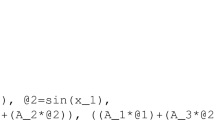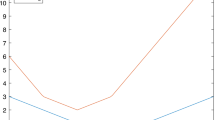Abstract
In this paper, we present an adaptive gradient method for the minimization of differentiable functions on Riemannian manifolds. The method is designed to minimize functions with Lipschitz continuous gradient field, but it does not required the knowledge of the Lipschitz constant. In contrast with line search schemes, the dynamic adjustment of the stepsizes is done without the use of function evaluations. We prove worst-case complexity bounds for the number of gradient evaluations that the proposed method needs to find an approximate stationary point. Preliminary numerical results are also presented and illustrate the potential advantages of different versions of our method in comparison with a Riemannian gradient method with Armijo line search.


Similar content being viewed by others
Data Availability
Data sharing not applicable to this article as no datasets were generated or analyzed during the current study.
Notes
We thank an anonymous reviewer for pointing this out.
See, e.g., Lemma 3.2 in [4].
This toolbox is freely available in the website https://www.manopt.org/. Specifically, we used the codes steepestdescent.m and linesearch.m. In the initialization, we substituted the manifold retraction (M.retr) by the exponential map (M.exp).
See Example 4 in [11].
The performance profiles were generated using the code perf.m freely available in the website http://www.mcs.anl.gov/~more/cops/.
See Section 5.2.1 in [11].
References
Absil, P.-A., Baker, C.G., Gallivan, K.A.: Trust-region methods on Riemannian manifolds. Found. Comput. Math. 7, 303–330 (2007)
Absil, P.-A., Mahony, R.: Sepulchre: Optimization Algorithms on Matrix Manifolds. Princeton University Press, Princeton (2008)
Armijo, L.: Minimization of functions having Lipschitz continuous first partial derivatives. Pac. J. Math. 16, 1–3 (1966)
Bento, G.C., Ferreira, O.R., Melo, J.G.: Iteration-complexity of gradient, subgradient and proximal point methods on Riemannian manifolds. J. Optim. Theory Appl. 173, 548–562 (2017)
Boumal, N.: An Introduction to Optimization on Smooth Manifolds. Cambridge University Press, Cambridge (2023)
Boumal, N., Absil, P.-A., Cartis, C.: Global rates of convergence for nonconvex optimization on manifolds. IMA J. Numer. Anal. 39, 1–33 (2019)
Boumal, N., Mishra, B., Absil, P.-A., Sepulchre, R.: Manopt, a MATLAB toolbox for optimization on manifolds. J. Mach. Learn. Res. 15, 1455–1459 (2014)
Cauchy, A.: Méthode générale pour la résolution des systemes d’équations simultanées. C. R. Acad. Sci. Paris 25, 536–538 (1847)
Cruz Neto, J.X., Lima, L.L., Oliveira, P.R.: Geodesic algorithms in Riemannian geometry. Balkan J. Geom. Its Appl. 3, 89–100 (1998)
Dolan, E., Moré, J.J.: Benchmarking optimization software with performance profiles. Math. Program. 91, 201–2013 (2002)
Ferreira, O.P., Louzeiro, M.S., Prudente, L.F.: Gradient method for optimization on Riemannian manifolds with lower bounded curvature. SIAM J. Optim. 29, 2517–2541 (2019)
Grapiglia, G.N., Stella, G.F.D.: An adaptive trust-region method without function evaluations. Comput. Optim. Appl. 82, 31–60 (2022)
Gratton, S., Jerad, S., Toint, Ph.L.: First-order objective-free optimization algorithms and their complexity. arXiv:2203.01757v1, (2022)
Grippo, L., Lampariello, F., Lucidi, S.: A nonmonotone line search technique for Newton’s method. SIAM J. Numer. Anal. 23, 707–716 (1986)
Lojasiewicz, S.: Une propriété topologique des sous-ensembles analytiques réels. Les équations aux dérivées partielles 117, 87–89 (1963)
Polyak, B.T.: Gradient methods for minimizing functionals. Zhurnal Vychislitel’noi Matematiki i Matematicheskoi Fiziki 3, 643–653 (1963)
Sachs, E.W., Sachs, S.M.: Nonmonotone line searches for optimization algorithms. Control Cybern. 40, 1059–1075 (2011)
Sato, H.: Riemannian Optimization and Its Applications. Springer, Berlin (2021)
Udriste, C.: Convex Functions and Optimization Methods on Riemannian Manifolds, vol. 297. Springer, Berlin (1994)
Ward, R., Wu, X., Bottou, L.: Adagrad Stepsizes: sharp convergence over nonconvex landscapes. J. Mach. Learn. Res. 21, 1–30 (2020)
Wu, X., Ward, R., Bottou, L.: WNGrad: learn the learning rate in gradient descent. arXiv:1803.02865, (2020)
Zhang, H., Sra, S.: First-order methods for geodesically convex optimization. In: Proceedings of the 29th annual conference on learning theory (2016)
Zhang, H., Hager, W.W.: A nonmonotone line search technique and its application to unconstrained optimization. SIAM J. Optim. 14, 1043–1056 (2004)
Acknowledgements
The authors are very grateful to the two anonymous referees, whose comments helped to improve the manuscript.
Author information
Authors and Affiliations
Corresponding author
Additional information
Communicated by Alexandru Kristály.
Publisher's Note
Springer Nature remains neutral with regard to jurisdictional claims in published maps and institutional affiliations.
G. N. Grapiglia was partially supported by the National Council for Scientific and Technological Development (CNPq) - Brazil (Grant 312777/2020-5). G.F.D. Stella was supported by the Coordination for the Improvement of Higher Education Personnel (CAPES) - Brazil
Rights and permissions
Springer Nature or its licensor (e.g. a society or other partner) holds exclusive rights to this article under a publishing agreement with the author(s) or other rightsholder(s); author self-archiving of the accepted manuscript version of this article is solely governed by the terms of such publishing agreement and applicable law.
About this article
Cite this article
Grapiglia, G.N., Stella, G.F.D. An Adaptive Riemannian Gradient Method Without Function Evaluations. J Optim Theory Appl 197, 1140–1160 (2023). https://doi.org/10.1007/s10957-023-02227-y
Received:
Accepted:
Published:
Issue Date:
DOI: https://doi.org/10.1007/s10957-023-02227-y




